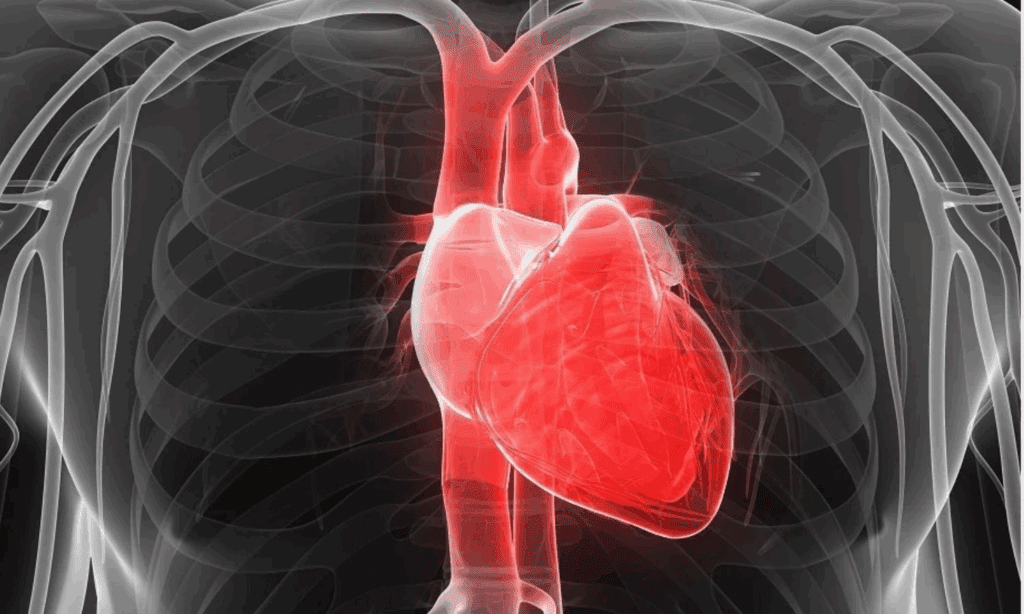Last Updated on November 25, 2025 by Ugurkan Demir

At Liv Hospital, we know how important it is to understand the difference between cardiomyopathy and congestive heart failure. Cardiomyopathy is a disease that affects the heart muscle. It can cause changes in the heart that make it work less well.
Discover the key differences between cardiomyopathy vs CHF and how each condition is diagnosed.
Congestive heart failure (CHF) is when the heart can’t pump enough blood for the body’s needs. Even though cardiomyopathy can cause heart failure, they are different conditions that need special care.
Dealing with these heart conditions can be tough. Our team focuses on you, giving care that fits your needs.

It’s important to know the basics of heart disease. This knowledge helps us understand conditions like cardiomyopathy and congestive heart failure. Heart disease includes many conditions that affect the heart’s structure and function.
The heart is a muscular organ that pumps blood. It has four chambers: the right and left atria, and the right and left ventricles. The heart pumps deoxygenated blood back to the lungs for oxygen. Then, it pumps oxygenated blood to the body. This is key for delivering oxygen and nutrients.
The right atrium gets deoxygenated blood from the body. This blood then goes to the right ventricle. The right ventricle sends it to the lungs for oxygen.
After getting oxygen, the blood returns to the heart. It enters the left atrium, then the left ventricle. The left ventricle pumps it out to the body. This process is vital for life.
Cardiovascular diseases include many conditions. These include coronary artery disease, heart failure, and cardiomyopathy. Coronary artery disease happens when arteries to the heart muscle get narrowed or blocked.
Heart failure, or congestive heart failure, occurs when the heart can’t pump enough blood. Cardiomyopathy is diseases of the heart muscle. The muscle becomes enlarged, thick, or rigid, making it hard for the heart to pump blood.
It’s key to understand these conditions for proper diagnosis and treatment. Early detection and management can greatly improve patient outcomes.

Cardiomyopathy is a disease that affects the heart muscle. It’s often linked to congestive heart failure, but they’re not the same. This condition is marked by enlarged ventricles with impaired function. It’s not caused by secondary issues like ischemic heart disease or high blood pressure.
Cardiomyopathy is a group of diseases that directly harm the heart muscle. This can lead to congestive heart failure among other complications. It’s important to understand the specifics of cardiomyopathy for proper diagnosis and treatment.
There are several types of cardiomyopathy, each with its own traits:
The causes of cardiomyopathy vary, including genetic factors, infections, and toxins. Key risk factors include:
Knowing these risk factors is key for early detection and management of cardiomyopathy. This can help prevent it from turning into congestive heart failure.
Exploring the link between cardiomyopathy and congestive heart failure shows they’re distinct. Cardiomyopathy can lead to CHF, but they need different treatments and approaches.
It’s important to know about congestive heart failure to manage its symptoms. This condition happens when the heart can’t pump enough blood. This leads to many problems.
Heart failure means the heart can’t pump blood well. This causes fluid buildup in the lungs and body. Symptoms include shortness of breath, fatigue, and swelling in the legs and ankles.
The heart’s pumping is measured by its ejection fraction. This shows how much blood is pumped out with each heartbeat. A low ejection fraction means heart failure.
Heart failure is divided based on the left ventricular ejection fraction (LVEF) and clinical staging. The main types are:
Clinical staging, from A to D, shows how severe heart failure is.
Many things can cause congestive heart failure. These include:
Knowing these causes helps prevent and manage CHF.
To grasp the severity of heart disease, it’s key to see how cardiomyopathy and congestive heart failure are linked. Cardiomyopathy affects the heart muscle, making it hard for the heart to work right. This can lead to congestive heart failure.
Cardiomyopathy weakens the heart muscle, making it tough for the heart to pump blood. This weakness can cause fluid to build up in the lungs and body, a sign of congestive heart failure. This can happen slowly, due to different types of cardiomyopathy.
Cardiomyopathy is a big reason for congestive heart failure, but it’s not the only one. High blood pressure, coronary artery disease, heart valve issues, and diabetes can also cause CHF. These conditions put a lot of strain on the heart, leading to failure if not managed well. Knowing these different paths is key to creating good treatment plans.
Nearly six million Americans have congestive heart failure, with causes like hypertension and cardiomyopathy playing a big role. Studies show cardiomyopathy is a top cause of heart failure. Seeing this link is important for doctors to give the right care and strategies.
Understanding the link between cardiomyopathy and congestive heart failure helps us see the heart disease’s complexity. This knowledge lets doctors create better plans and help patients more.
It’s important to know the differences between cardiomyopathy and congestive heart failure. Both affect the heart but in different ways. They have different causes and symptoms.
To diagnose cardiomyopathy and CHF, doctors use several methods. They look at your medical history, do a physical exam, and run tests. For cardiomyopathy, echocardiography is key to check the heart muscle.
Diagnosing CHF also involves tests like electrocardiography (ECG) and biomarkers. These tests help find out if you have heart failure.
Diagnostic Tests:
| Test | Cardiomyopathy | CHF |
| Echocardiography | Assesses heart muscle structure and function | Evaluates heart failure severity |
| Electrocardiography (ECG) | May show arrhythmias or conduction abnormalities | Helps identify underlying causes of heart failure |
| Biomarkers (e.g., natriuretic peptides) | Not typically used for diagnosis | Elevated levels indicate heart failure |
Treatment for cardiomyopathy aims to manage symptoms and slow disease progression. It includes medications and lifestyle changes. CHF treatment focuses on improving heart function and quality of life. It involves a mix of treatments based on the condition’s severity.
The outlook for cardiomyopathy and CHF depends on several factors. Early diagnosis and treatment can greatly improve outcomes. Cardiomyopathy patients may have varying outcomes, from stable to worsening heart failure. CHF is a chronic condition needing ongoing care.
A thorough care plan is essential for both conditions. It includes regular check-ups, sticking to medication, and making lifestyle changes. This helps improve patient outcomes.
Spotting cardiomyopathy and CHF early is key. It’s about catching the subtle signs that are easy to overlook. We’ll look at the symptoms of both conditions and when you should see a doctor.
Cardiomyopathy can show in many ways, some not so obvious. Common signs include:
These happen because the heart muscle is weak. This makes it tough for the heart to pump blood well.
Heart failure symptoms are similar to cardiomyopathy’s. Key signs are:
Don’t ignore symptoms like trouble lying flat, too much urination, or swelling in the legs.
If you notice any of these, get medical help fast:
Doctors use a mix of medical history, physical exams, and tests to find heart problems. These steps help figure out what’s wrong and how bad it is. This info helps decide the best treatment.
Imaging tests are key in finding heart issues. Here are some important ones:
Labs play a big part in diagnosing heart issues. They include:
| Laboratory Test | Purpose |
| Brain Natriuretic Peptide (BNP) | To diagnose and assess the severity of heart failure |
| Lipid Profile | To evaluate cholesterol levels and cardiovascular risk |
There are more tests used too, like:
Together, these tests help doctors accurately diagnose heart problems. They then create a treatment plan to help the patient.
Managing cardiomyopathy and congestive heart failure needs a detailed plan. This plan includes medicines, surgery, and rehab. We’ll look at the different treatments for both conditions. It’s key to use a mix of approaches for the best care.
Medicines are vital for treating both cardiomyopathy and heart failure. For heart failure, ACE inhibitors and beta-blockers are key. They help patients live longer and go to the hospital less often. In cardiomyopathy, medicines help reduce the heart’s work, manage symptoms, and prevent problems.
For heart failure, diuretics help with swelling and breathing issues. ARBs are sometimes used instead of ACE inhibitors. The right medicine depends on the type of cardiomyopathy and how severe the heart failure is.
Sometimes, surgery or devices are needed to manage cardiomyopathy and heart failure. Implantable cardioverter-defibrillators (ICDs) prevent sudden death by shocking the heart when needed.
Cardiac resynchronization therapy (CRT) helps the heartbeat be more in sync. This makes the heart work better and reduces heart failure symptoms. Surgery might include a heart transplant or fixing or replacing heart valves.
Changing daily habits is key for managing cardiomyopathy and heart failure. Patients are told to eat well, exercise, and avoid smoking and too much alcohol.
Cardiac rehabilitation programs offer support and help with these lifestyle changes. Combining medicine with lifestyle changes improves patients’ lives and health.
Getting a diagnosis of cardiomyopathy or congestive heart failure can change your life. It’s clear that managing these conditions needs a lot of care and support. With the right approach, people can live active lives.
Keeping your heart healthy is key when you have cardiomyopathy or heart failure. This means taking medicine, making lifestyle changes, and seeing doctors regularly. We stress the need for a care plan that fits you to improve your life quality.
Knowing the difference between cardiomyopathy and heart failure helps patients make better choices. Our goal is to offer top-notch healthcare and support. We want to help patients manage their condition well.
Good management lets people stay independent and enjoy their favorite activities. We’re dedicated to giving the support and resources needed. Our aim is to help patients get the best results.
Cardiomyopathy is a disease that affects the heart muscle. Congestive heart failure (CHF) is when the heart can’t pump enough blood. Cardiomyopathy can cause CHF, but they are different conditions.
No, they are not the same. Cardiomyopathy affects the heart muscle. It can lead to heart failure, but they are distinct.
Yes, it can. Weakened heart muscle makes it hard to pump blood. This can lead to heart failure.
Symptoms of cardiomyopathy include shortness of breath and fatigue. CHF symptoms are difficulty breathing and swelling. Both need quick medical help if symptoms get worse.
Diagnosis involves imaging tests like echocardiograms and lab tests. These help assess heart function and find causes.
Treatments include medications and lifestyle changes. Surgery and devices may also be used. Rehabilitation is key in managing both conditions.
Damaged heart muscle reduces blood pumping ability. This can cause fluid buildup in the body, leading to CHF.
Yes, there are several types. Dilated, hypertrophic, and restrictive cardiomyopathy each affect the heart differently.
Prognosis depends on cause, severity, and treatment response. With proper care, many can live active lives. Close monitoring with healthcare providers is essential.
Yes, lifestyle changes can help. A healthy diet, exercise, stress reduction, and avoiding smoking improve heart health for both conditions.
Ruel, M. (2024). Coronary artery bypass grafting: Past and future. Circulation, 150(10), 763-766. https://www.ahajournals.org/doi/10.1161/CIRCULATIONAHA.124.068312
Subscribe to our e-newsletter to stay informed about the latest innovations in the world of health and exclusive offers!